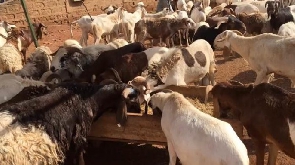Some butchers, and abattoir workers in the Upper East region had not been to work for more than 10 days following a lockdown of cattle in the country, especially the region.
At some point, the entire country was also advised to halt the consumption of cattle for some time.
This was due to the outbreak of the Anthrax disease.
According to the Centers for Disease Control and Prevention, Anthrax is a serious infectious disease caused by gram-positive, rod-shaped bacteria known as bacillus anthracis.
It occurs naturally in soil and commonly affects domestic and wild animals around the world. People can get sick with anthrax if they come in contact with infected animals or contaminated animal products. Anthrax can cause severe illness in both humans and animals.
On June 6, 2023, the Office of the Upper East Regional Coordinating Council confirmed the outbreak of the Anthrax disease which was first confirmed in the region.
Following the confirmation, the Council banned the movement of all small ruminants including sheep, goat, pigs, cattle and dogs from the Eastern corridor of the Region, thus Bawku Municipality, Bawku West, Pusiga, Garu, Tempane and Binduri districts.
It also directed the Municipal and District Chief Executives to ensure that slaughtering, sales and consumption of cattle, sheep, goats and dogs were banned for a period of one (1) month effective 6th June, 2023.
The Upper East Regional Coordinating Council also instructed the police to apprehend or arrest any person or group of persons who flout(s) the directives above.
In a press release, the Council stated that at an emergency meeting of the Regional Public Health Emergency Management Committee held on Monday, June 5, 2023, to examine a suspected outbreak of anthrax in the Eastern part of the region, Bansi Community in Binduri, and Sapeliga Community in the Bawku West Districts respectively, following the notification of a suspected anthrax outbreak to the region on May 31, 2023, it was noted that two (2) samples taken from two (2) cattle tested positive for anthrax.
“Therefore, an outbreak of anthrax has been confirmed in these two (2) Districts,” it stated.
The Office of the Upper East Regional Coordinating Council noted that as of Friday, 2nd June 2023, seven (7) cattle and twenty-three (23) sheep and goats had been confirmed dead in the two (2) named above communities.
Among humans, it said as of 5th June 2023, thirteen (13) suspected human anthrax cases including one (1) death had been reported from Bansi Community in the Binduri District, adding that eleven (11) human samples have been sent to Pong-Tamale Veterinary Laboratory and are awaiting Laboratory results.
Subsequently, the Upper East Regional Minister, Mr Stephen Yakubu also at a press briefing made it known that vaccination had started, adding that after 70 percent of the animals have been vaccinated, the butchers and abattoir operators can go back to work.
Watch the latest edition of BizTech and Biz Headlines below:
He appealed to the media to help with public education in order to contain the disease.
The Deputy Minister for Food and Agriculture, Mr Yaw Frimpong Addo in an interview with Atinka TV’s Ghana Nie, made it known that the Veterinary College of Ghana, Pong Tamale has produced over 200,000 vaccines as at Wednesday, June 14, 2023 in response to the anthrax disease.
He noted that when COVID-19 broke, the Veterinary College turned its laboratory to producing vaccines and after getting the required laboratory equipment, it uses the same equipment to produce other vaccines, including the ones being used to fight Anthrax.
According to him, as of Wednesday, the vaccines were being administered to all the cattle in the various districts in order to contain the disease.
Despite the warning, Yaw Frimpong observed that some persons had killed and grilled some of the animals and transported them to the Southern Part of Ghana.
Meanwhile, he said as of Wednesday, about 94 cattle had been reported dead.
Aside from that, reports have also indicated that three persons died from the disease.
Mr Yaw Frimpong therefore encouraged people to stop chewing meat until the area they purchase is declared an anthrax free zone.
“We all have to be careful because if it is the same virus that killed that animal, even when you grill it and eat, you will be infected.
Also, he said there were some designated abattoirs that check all the animals before they kill it, urging those who cannot do without meat to at least visit such places to purchase their meat when they need to.
A Chairman of the Butchers Association at Bolga in the Upper East Region, Alhaji Inusah Sameri complained about how the ban on the slaughtering, selling and eating of cattle has affected the businesses of the butchers.
For more than nine days, they were not working.
That, he noted, affected their families a lot since their major source of livelihood had been put on hold.
Meanwhile, he said some of the veterinary doctors who were taking part in the vaccination of the cattle complained that they had not been given fuel to transport the vaccines therefore put the vaccination on hold.
Meanwhile, he noted that authorities earlier stated that until 70 percent of the cattle are vaccinated, no butcher or abattoir worker should resume their work.
He was, therefore, living in fear that the vaccination of the 70 percent of cattle would not be realised soon.
Another abattoir worker at Sandema, Kwesi Adamu also complained about how the lockdown had affected his family.
“The lockdown has really affected us. When you look at our place, it is very empty, no one is bringing the animals for slaughtering due to the directives, meanwhile, this is where we get our daily bread."
A butcher who has also been in the business for more than 30 years, Umoro Yakubu, Sakora said he has never encountered such a lockdown since he entered the business, complaining of how the disease had affected their businesses.
He noted that the veterinary officers were still carrying on with their vaccination of the cattle in the region.
“For the past two weeks, we have just been sitting and eating; it is not easy taking care of our wives and children,” he said.
Subsequently, the outbreak of Anthrax affected sales of meat during the Eid celebrations.
In a latest, the lockdown was has been eased, allowing persons to sell, slaughter and or eat only vaccinated cattle, sheep, goats etc.
This report was made possible with technical support from the Centre for Science and Health Communication (CSHC) and supported by the National Research Foundation, South Africa.
Business News of Friday, 14 July 2023
Source: atinkaonline.com













